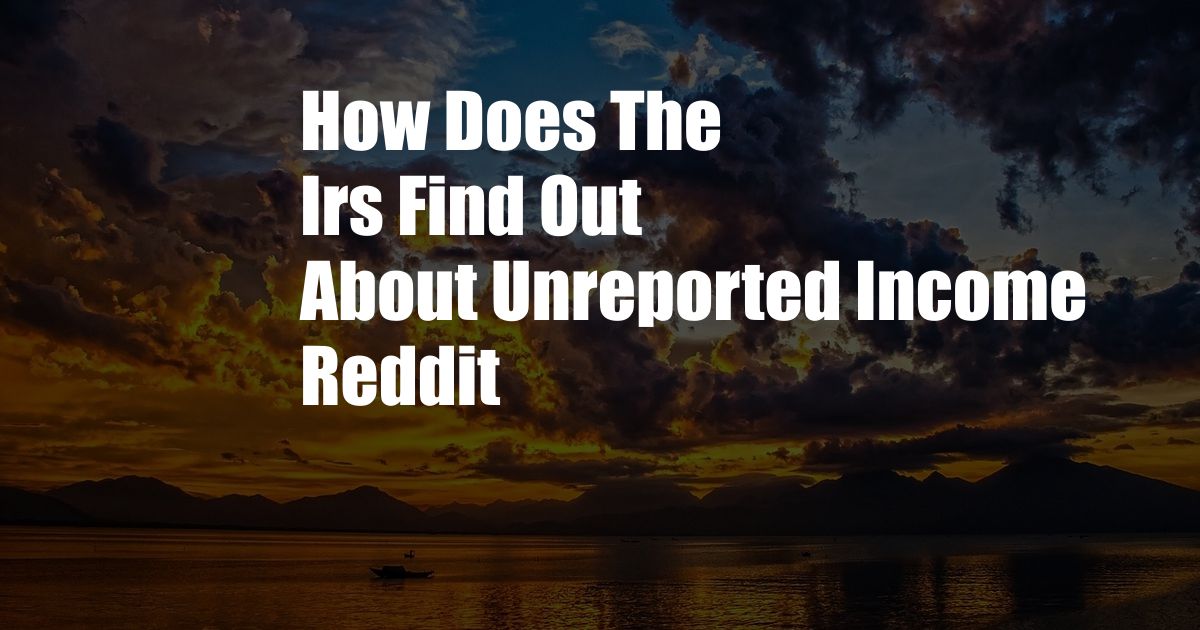
Understanding How the IRS Discovers Unreported Income: A Comprehensive Guide
Have you ever wondered how the Internal Revenue Service (IRS) finds out about your unreported income? It’s a question that keeps many Americans on edge, especially during tax season. After all, no one wants to run the risk of an IRS audit or face penalties for unpaid taxes.
Discrepancies in Reporting
One of the primary ways the IRS detects unreported income is through discrepancies in reporting. For example, if you fail to report income from self-employment, investments, or gambling, the IRS can identify these discrepancies by comparing the information you provide on your tax return to data reported by third parties.
Information Matching Programs
The IRS employs sophisticated information matching programs that cross-check data from various sources, such as banks, employers, and investment firms. These programs flag any discrepancies between the income you report on your return and the income reported to the IRS by these third parties.
Tips from Informants
The IRS often relies on tips from informants to uncover unreported income. These informants can be former employees, business partners, or even disgruntled taxpayers who know about your unreported income. While the IRS protects the confidentiality of its informants, they play a crucial role in detecting tax fraud.
Audits
If the IRS has reason to believe that you have underreported your income, they may initiate an audit. During an audit, the IRS will review your tax returns and financial records to determine if you have complied with the tax laws. Audits can be random, or they can be triggered by specific information that the IRS has gathered through its information matching programs or from informants.
Penalties and Consequences
Unreported income can lead to significant penalties and consequences, including:
- Back taxes and interest on the unpaid taxes
- Fines and penalties for underreporting income
- Criminal charges in cases of tax evasion or fraud
Tips to Avoid Unreported Income
To avoid the risks associated with unreported income, follow these tips:
- Keep accurate financial records that document all income and expenses.
- Report all income from all sources, including self-employment, investments, and gambling.
- Use tax software to prevent errors in your tax return calculations.
- Consider hiring a tax professional to review your return before filing.
Expert Advice
In addition to the tips above, experts recommend the following:
- Be aware of the IRS’s information matching programs and the potential for audits.
- Understand your tax obligations and consult reputable sources for guidance.
- If you make a mistake on your tax return, file an amended return as soon as possible to correct it.
FAQs
Q: Can the IRS track my cash income?
A: Yes, the IRS can track cash income through various methods, such as examining bank deposits, purchases, and withdrawals.
Q: What happens if I underreport my income unintentionally?
A: Unintentional underreporting can still lead to penalties and interest charges. It’s crucial to be as accurate as possible when filing your tax return.
Q: Can the IRS forgive unreported income?
A: In certain cases, the IRS may consider forgiveness programs for unreported income. However, these programs typically have strict eligibility requirements and involve significant penalties.
Conclusion
Understanding how the IRS detects unreported income is essential for taxpayers of all income levels. By following the tips and expert advice provided in this article, you can minimize the risk of an IRS audit and ensure that you are paying your fair share of taxes.
Are you concerned about the possibility of unreported income or potential IRS audits? Share your questions or experiences in the comments below.